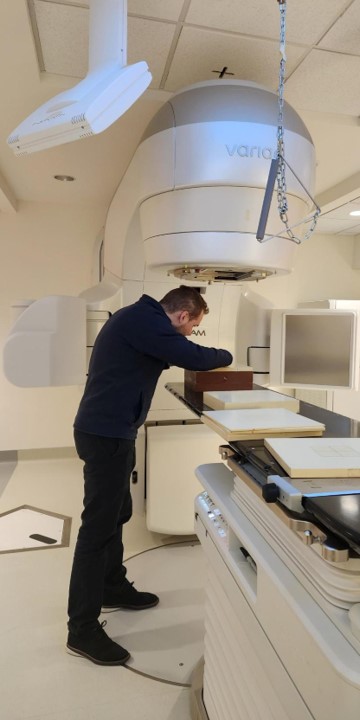Residency Curriculum
The Therapeutic Medical Physics Residency Program is a CAMPEP-accredited, two-year program designed to train residents for independent clinical practice. Our program focuses on developing strong clinical skills, confidence, and professional growth while preparing residents for successful and rewarding careers in medical physics.
Throughout the two years of clinical training, residents gain a solid understanding of the role of patient safety in the clinical practice of medical physics, along with the technical knowledge, skills, and competencies needed for the safe and effective use of radiation therapy technologies. The curriculum blends theoretical learning, hands-on clinical experience, and professional development, helping residents build a strong foundation for board certification and independent practice.
Year One curriculum
During the first year, residents focus on developing a strong foundation in clinical medical physics. They work closely with medical physicists and dosimetrists while rotating through five core clinical areas to gain practical experience with the fundamental principles, techniques, and workflows of the field.
Residents receive a detailed rotation schedule outlining the duration, learning objectives, evaluation criteria, and recommended reading for each rotation. Performance is assessed regularly to ensure competency development, and each rotation concludes with a mock oral exam conducted by preceptors and faculty.
Year One Rotations
- Dosimetry
- Informatics
- Quality Assurance and Plan Review/Annual QA
- Radiation Safety
- Special Procedures: Total Body Irradiation
- Stereotactic Body Radiation Therapy (SBRT)/Stereotactic Radiosurgery (SRS)
Year Two curriculum
In the second year, residents focus on advancing their clinical expertise, developing independent practice skills, and preparing for board certification. With increased autonomy, residents strengthen their critical thinking and problem-solving abilities while rotating through the remaining clinical areas. Some rotations from the first year are revisited at a more advanced level to reinforce core competencies.
Second-year residents take on greater clinical responsibility, including serving as Physicist of the Day (POD), and provide mentorship to first-year residents to support their transition into the program. Protected time is provided for studying for the American Board of Radiology (ABR) Part 2 exam.
Performance evaluations continue throughout the year, and each rotation concludes with a mock oral exam with faculty and preceptors. These sessions are designed to prepare residents for the ABR Part 3 Oral Certifying Exam.
Year Two Rotations
- Acceptance & Commissioning
- Annual Quality Assurance
- Brachytherapy
- Projects (Optional)
- Protons
- Radiation Shielding
- Special Procedures: Total Skin Electron Therapy
- Therapeutic Imaging
Medical physics residents participate in a structured didactic curriculum designed to complement their clinical training and support preparation for board certification.
Required Educational Activities
Residents are required to attend and actively participate in:
- Ethics, Professionalism, Leadership, and Career Development sessions
- Department Chart Rounds
- Department Grand Rounds
- Medical Physics Bootcamp
- Morbidity and Mortality Conference
- Physics Didactic Lecture Series
- Physics Journal Club
Recommended Educational Activities
Residents are strongly encouraged to attend:
- Radiation Oncology Resident Didactic
- Disease-Site Tumor Boards
- Graduate Medical Physics Journal Club
- Graduate Medical Physics Advanced Imaging Course
- Radiation Biology Bootcamp
Teaching Responsibilities
Residents also participate in educational activities by delivering lectures or leading practicums for graduate students and/or radiation oncology residents, developing both teaching and communication skills.
The Therapeutic Medical Physics Residency Program does not include a formal research requirement; however, residents are strongly encouraged to develop research and problem-solving skills through clinical implementation projects that involve literature review, experimental design, data analysis, and documentation. Residents are allotted up to three months in Year Two of training to complete research or clinical projects.
Examples of Resident Projects:
- Beam modeling and validation testing of the VersaHD in Eclipse prior to FDA release
- Modeling and validation of a couch top designed to enable compatibility between the Hexapod table and the Calypso tracking system
